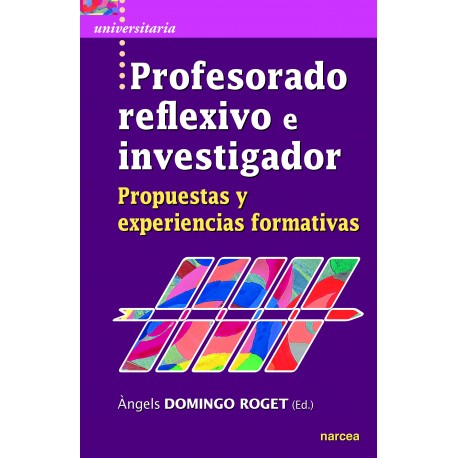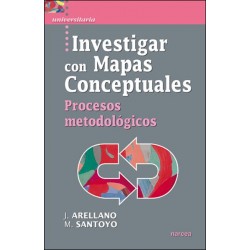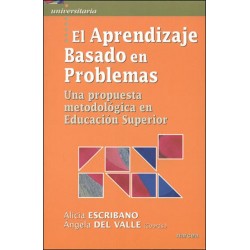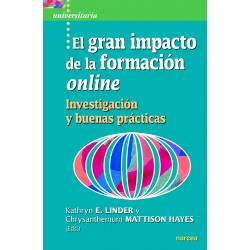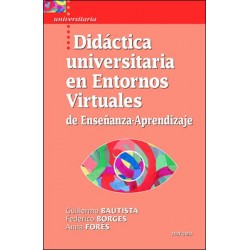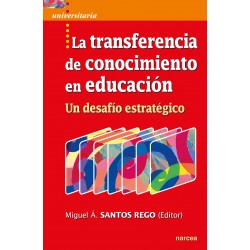Herramientas de accesibilidad
Profesorado reflexivo e investigador
Propuestas y experiencias formativas
Este libro se propone eliminar las barreras que la tradición académica ha construido lentamente, a lo largo del tiempo, entre dos actividades que en realidad son inseparables: la docencia y la investigación.
Es en las aulas donde maestros y profesores llevan a cabo su función docente y educadora y donde afrontan grandes interrogantes, problemas y situaciones que precisan investigarse: las aulas son actualmente los laboratorios de investigación educativa. Por ello, en el perfil del profesorado deberían estar intrínsecamente enlazadas las habilidades investigadoras y las habilidades docentes que configuran al profesor-investigador.
El libro plantea la urgente necesidad de aproximar la investigación educativa a la problemática real de las aulas y para ello propone que sea el mismo docente, como docente-investigador quien actúe a modo de puente que facilita el camino y acorta la distancia entre enseñar e investigar.
A partir del pensamiento de Donald Schön, quien considera al docente como un investigador en contexto práctico, esta obra coral invita a avanzar en la consolidación de una nueva cultura docente basada en la indagación. El aula es el escenario donde surgen las grandes hipótesis y las tesis que precisan ser resueltas para mejorar los procesos de aprendizaje.
El libro no plantea una ilusión utópica; propone y muestra cómo, desde la formación inicial, cualquier educador puede adquirir las habilidades necesarias para investigar su actividad docente, como medio de mejora permanente de la práctica profesional.
- ISBN
- 9788427727359
- Páginas
- 192
- Edición
- 1ª edición
- Fecha de edición
- 2020
- Alto
- 21,50 cm
- Ancho
- 15,00 cm
Prólogo. Miguel A. Zabalza
I. Hacia una cultura docente basada en la indagación
1. Rasgos y habilidades del profesor-investigador
2. Modelos para desarrollar una docencia indagadora
II. Entre la investigación y la docencia universitaria. Un acercamiento desde la práctica reflexiva
3. De la reflexión sobre el objeto de estudio a la reflexión sobre la práctica de la investigación
4. El investigador en el aula universitaria como practicante reflexivo
III. La competencia investigadora en la formación inicial de docentes
5. Del maestro reflexivo al maestro investigador
6. El papel de la investigación en la formación inicial de maestros y maestras
7. La investigación formativa y el codiseño como estrategias metodológicas para el desarrollo
de la competencia investigadora
IV. Estrategias de reflexión pedagógica para potenciar la investigación y la transformación de las prácticas docentes en el aula: círculos de reflexión y de escritura reflexiva
8. Círculos de reflexión pedagógica para el fortalecimiento de las competencias investigativas del docente y de su saber pedagógico
9. La escritura reflexiva y su importancia para el desarrollo de un profesor que investiga su propia práctica
CONTENT
The main purpose of this book is to remove the barriers the academic tradition has slowly built, through time, between two activities that, in fact, are inseparable: teaching and research.
At present, classrooms can be thought of as laboratories where teachers develop their teaching activity and deal with the big questions, problems and situations that need to be explored. That is why the research skills and the teaching skills –both being components of the teacher-researcher– should be intertwined in the teacher’s professional profile.
This book poses the urgent need for bringing the teaching research nearer the real problems of the classroom, and suggests letting the teacher himself –as a teacher-researcher– be the bridge that can ease the path and shorten the distance between teaching and researching.
Built on the thought of Donal Shön, who thinks of the teacher as a researcher on a practical setting, this choral work invites us to strengthen a new teaching culture based on investigation. The classroom is the stage where the major hypothesis and thesis that need to be resolved in order to improve the learning processes arise.
This book does not pose a delusional utopia; on the contrary, it proposes and shows how, from his initial training, any educator can acquire the necessary skills to study his teaching activity as a means of improving his professional practice.
The authors of this book, coordinated by Àngels Domingo Roget, PhD in Pedagogy (International University of Catalonia), are teachers with an extensive and diverse classroom experience at the different levels of several European and American educational systems. They have taught teachers and professors at Chilean, Mexican and Spanish Universities to research. Their book offers two important contributions: conceptual fundamentals to integrate teaching and research, and innovative experiences about how to teach teachers and professors to integrate research in their practice, in order to optimize it.
EXTRACT OF THE INDEX
Foreword: Miguel A. Zabalza
I. Towards an inquiry-based teaching culture
1. Attributes and skills of the teacher-researcher
2. Inquiring teaching –Development models
II. Between research and university teaching. A reflective practice approach
3. Going from reflecting on the subject matter, to reflecting on the research practice
4. The researcher in the university classroom as a reflective practitioner
III. Research capability in initial teacher preparation
5. A reflective teacher becoming a researcher teacher
6. The role of research in the initial teacher preparation
7. Formative research and co-design as methodological strategies for the development of research aptitude
IV. Reflective educational strategies to enhance research of teaching practices in their classroom and the transformation –reflection circles and reflective writing
8. Educational reflection circles aiming to strengthen the teacher’s investigative competences and his pedagogical knowledge
9. Reflective writing and its importance for the development of a teacher who explores his own practice
Àngels Domingo Roget (Ed.)
Coordinadas por Àngels Domingo Roget, Doctora en Pedagogía por la Universitat Internacional de Catalunya, las autoras del libro, docentes con una extensa y diversa experiencia de aula en los diferentes niveles de los sistemas educativos de Europa y América que enseñan a investigar a maestros y profesores en universidades de Chile, España y México, ofrecen dos grandes aportaciones en este libro: bases conceptuales para integrar docencia e investigación, y experiencias innovadoras de cómo enseñar a investigar a maestros y profesores en su práctica, con el fin de optimizarla.

